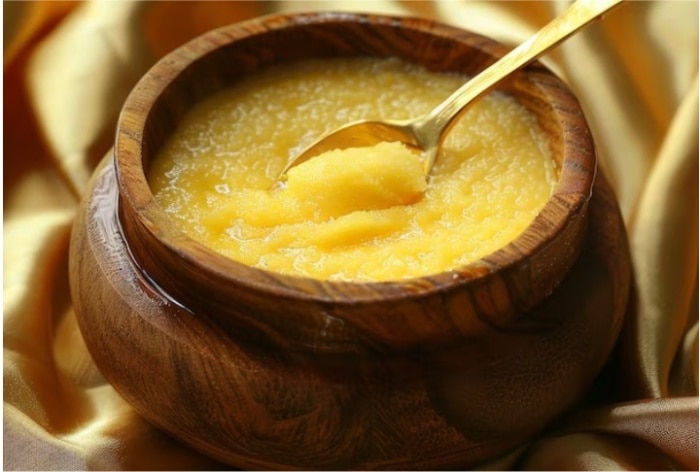In this article, we discuss how ghee can prove beneficial during monsoon and contribute to overall gut health.
Ghee, a form of clarified butter commonly used in Indian cooking, is often credited for its numerous health benefits. During the monsoon season, when the risk of digestive problems is higher due to increased humidity and prevalence of waterborne diseases, ghee can play a crucial role in maintaining gut health. Below, we take a closer look at how ghee can prove beneficial during monsoons and contribute to overall gut health.
Ghee is made by simmering butter to remove the water content and milk solids, leaving only the butterfat. This process not only improves its taste but also increases its shelf life and stability at high temperatures. Rich in vitamins A, D, E and K, ghee is also a source of healthy fats, including butyrate, a short-chain fatty acid beneficial for gut health. Mr. Ravin Saluja, Director, STERLING AGRO INDUSTRIES LIMITED (Nova Dairy Products), shares the benefits of desi ghee for gut health and how to incorporate it into your diet.
Ghee and intestinal health
1. Rich in butyrate
Butyrate is a short-chain fatty acid that is produced when beneficial bacteria in the gut ferment dietary fiber. Ghee contains a significant amount of butyrate, which acts as a primary energy source for colon cells and plays a critical role in maintaining the health of the intestinal lining. Butyrate helps reduce inflammation in the gut, supports the integrity of the intestinal barrier, and may improve symptoms of inflammatory bowel diseases such as Crohn’s disease and ulcerative colitis.
2. Promotes digestion
Ghee stimulates the secretion of stomach acids, which helps in effective digestion of food. This is especially important during the rainy season when digestive processes can become slow due to high humidity and lack of physical activity. Incorporating ghee into the diet can help maintain optimal digestive function and prevent problems like bloating, indigestion and constipation.
3. Antimicrobial properties
The fatty acids in ghee, including butyrate, have antimicrobial properties that help fight harmful bacteria in the gut. During the rainy season, the risk of contracting infections from contaminated water and food is higher. Consuming ghee can help protect the gut from these pathogens and encourage the growth of beneficial bacteria, maintaining a healthy microbial balance.
4. Improves nutrient absorption.
Ghee helps in the absorption of fat-soluble vitamins (A, D, E, and K) and other essential nutrients from the food you eat. This is crucial during monsoons when the body’s immunity can be compromised. By improving nutrient absorption, ghee ensures that your body receives the necessary vitamins and minerals to strengthen the immune system and maintain overall health.
How to incorporate ghee during the rains
1. Cooking with ghee
One of the easiest ways to incorporate ghee into your diet is to use it for cooking. Ghee’s high smoke point makes it ideal for sautéing, frying, and baking. You can use it to prepare traditional rainy season dishes like khichdi, a comforting and easily digestible meal made with rice and lentils, or add it to soups and stews for intense flavor and added health benefits.
2. How to add ghee to drinks
Ghee can be added to warm drinks like herbal teas or milk. A popular drink during the monsoon is turmeric milk, made with warm milk, turmeric and a teaspoon of ghee. This soothing drink not only supports gut health, but also boosts immunity and provides anti-inflammatory benefits.
3. Using ghee as a spread
Instead of butter or margarine, use ghee as a spread on your toast or crispbread. It adds a delicious flavor and provides the benefits of healthy fats. Combine it with honey or spices like cinnamon for a tasty and nutritious snack.
4. Incorporating ghee into desserts
Many traditional Indian desserts prepared during monsoons, such as halwa or ladoo, use ghee as the main ingredient. These delicacies, when consumed in moderation, can offer the health benefits of ghee while also satisfying sweet cravings.
Precautions and moderation
While ghee has numerous health benefits, it is still a type of fat and should be consumed in moderation. Excessive consumption can lead to weight gain and other health problems. It is also important to make sure you use high-quality organic ghee to avoid potential contaminants.
Ghee is a versatile and beneficial dietary addition, particularly during the rainy season when gut health can be compromised. Its rich butyrate content, antimicrobial properties, and ability to support digestion and nutrient absorption make it an excellent choice for maintaining gut health. By incorporating ghee into your daily diet, you can enjoy its numerous health benefits while savoring its rich, buttery flavor. Remember that moderation is key to reaping the benefits of this golden elixir without overindulging.
